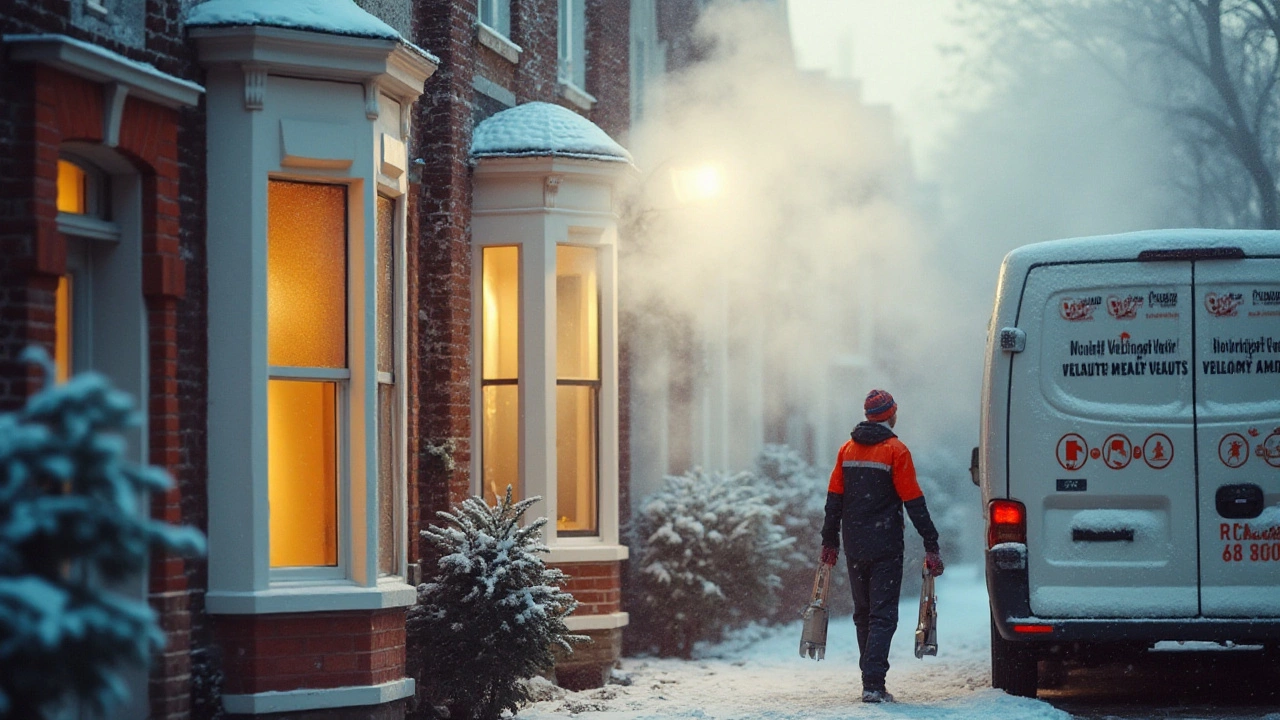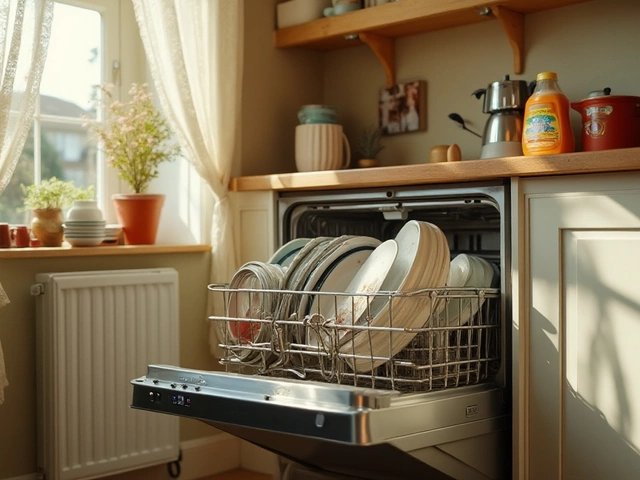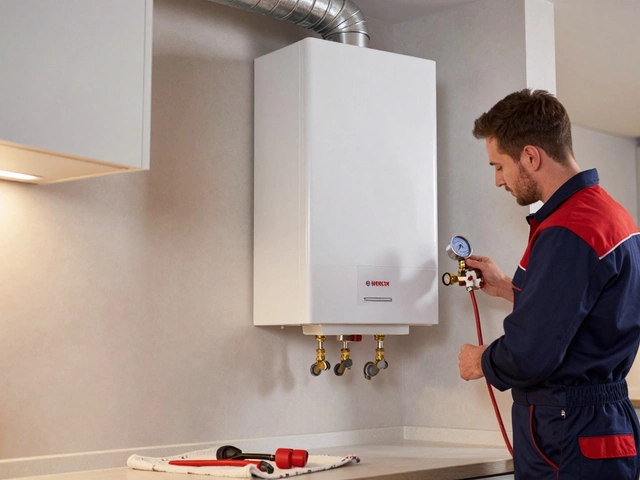As the winter chill settles, ensuring your boiler is working efficiently becomes more than just a comfort; it's a necessity. A boiler in perfect shape guarantees warmth and safety during the cold months, but when things go awry, knowing who to call becomes vital. Understanding who can service your boiler can make the difference between a prolonged heating issue and a swift, professional repair.
For many, boilers remain a mystery – a box tucked away in a closet that suddenly demands attention when it starts acting up. Finding the right expert is not just about getting someone with a toolbox; it’s about ensuring the person has the right skills and certifications to handle the complexities of your heating system. Let's delve into what you should consider when seeking boiler repair services.
- Understanding Boiler Basics
- Why Professional Service Matters
- Types of Boiler Services
- Choosing the Right Service Provider
- Signs You Need a Repair
- Maintaining Your Boiler for Longevity
Understanding Boiler Basics
Boilers are at the heart of many home heating systems, providing the warmth that keeps us cozy throughout the chillier months. To grasp how a boiler functions, it’s essential to understand that its primary role is to heat water, which is then distributed through your home, either as hot water flowing through taps or as steam circulated by radiators. At its core, a boiler combusts fuel, such as natural gas, oil, or electricity, to heat the water. This heated water or steam is channeled through pipes to radiators, thermal units, or even a radiant floor system, delivering heat precisely where it's required. Unlike forced-air systems that use ducts to disperse warm air, boilers provide a different heating experience that many find offers more even and consistent warmth.
The mechanics of a boiler can be as intricate as they are critical. Within most boilers, you will find components like the burner where the fuel combustion takes place, and the heat exchanger which transfers this heat to the water. Modern boilers often come with advanced control systems to manage temperatures and even achieve high efficiency ratings upwards of 90%. This is due to condensing technology that captures heat from the exhaust gases, a feature not present in older models. Investing in a newer boiler model not only benefits from increased energy efficiency but can also reduce monthly heating costs significantly, at upwards of 30% in some cases.
A fascinating insight shared by experts shines a light on the importance of regular boiler maintenance. According to the Energy Saving Trust, “an efficiently working boiler can lead to savings of around £300 per year on home heating costs.”
The efficacy of a boiler is intertwined with its maintenance regime — regular servicing not only ensures safety but extends the life of the unit considerably, protecting against sudden breakdowns during peak winter months.This underscores the practice of regular inspections and timely repairs which are crucial for the longevity of these heating systems. It's worth noting that most boilers operate quietly, but persistent noises such as clunking or gurgling are often precursors of underlying issues, thus making them worthy of immediate attention to prevent unnecessary damage.
Another layer of understanding lies in differentiating between boiler types, such as combi, system, and regular boilers. Combi boilers take the lead in popularity due to their efficiency and compact design, supporting both water heating and central heating needs without requiring separate water tanks. System boilers, on the other hand, are beneficial for homes with higher demands, as they incorporate a built-in exchanger to store hot water, making them a preferred choice in larger households. Meanwhile, conventional boilers, often paired with a separate hot water tank, are still in use in traditional settings, providing great reliability though at the cost of space and efficiency compared to their modern counterparts.
In essence, understanding these basics about boilers not only equips homeowners to better communicate with service professionals but also empowers them to make informed decisions regarding the upkeep and potential upgrades of their heating systems. Familiarity with the varied components and operation principles can lead to early detection of issues, ensuring a warm, comfortable living environment is consistently maintained.
Why Professional Service Matters
Choosing a professional to service your boiler isn't just a smart decision—it's essential for several significant reasons. First and foremost, boiler repair involves complex mechanisms that require a trained touch. Unlike other household appliances, boilers work under high pressure and temperatures, making them potentially dangerous if not handled correctly. Engineers who specialize in boiler maintenance are equipped with the knowledge and tools necessary to perform repairs safely and efficiently. They can quickly diagnose problems that might elude the average homeowner, ensuring that any underlying issues are addressed before they become bigger headaches. According to the Building Services Research and Information Association, regular professional servicing can prolong a boiler's life by up to 40%, while poor maintenance can lead to system failures and costly replacements.
"The key to extending the longevity of your heating system lies in consistent, professional attention," notes the National Heating Engineers Association. "It's not just fixing what's broken; it's about preventing the breakages from happening in the first place."
Another critical aspect of hiring a professional is the assurance of quality service. Accredited technicians are certified to adhere to industry standards, which means they perform their tasks following strict guidelines that prioritize safety and efficiency. This expertise might cover everything from checking the boiler's temperature and pressure to testing the safety controls. The complexity of these tasks often demands a deep understanding of the system's workings, which invariably leads to more reliable outcomes and greater peace of mind for homeowners. Choosing certified professionals to take care of boiler repair activities can also help in maintaining warranties that might otherwise be voided by amateur tinkering.
Engaging the services of professionals isn't just about fixing current issues; it's about investing in the long-term health of your system. Consider the potential costs associated with frequent malfunctions due to neglect or improper handling. By opting for expert help, you're essentially reducing the cumulative expense of small repairs that might snowball into larger problems if ignored. A poorly maintained boiler may contribute to increased utility bills, as it struggles to operate efficiently. The Energy Saving Trust notes that a faulty system can increase heating costs by up to 20%, underscoring the financial benefits of regular professional tune-ups.
Moreover, regular professional servicing can help in maintaining optimal energy efficiency, an important factor given the rising costs of energy and environmental concerns. Properly maintained boilers burn fuel more efficiently, reducing carbon emissions and contributing to a greener environment. This perspective is critical, especially when considering the broader implications of your household's carbon footprint. An efficiently running boiler system not only benefits the individual home but also plays a part in larger sustainability efforts. Remember, taking the step to get professional service is more than a simple check-up; it's a commitment to safety, efficiency, and environmental responsibility. Making this choice ensures a warmer, safer, and potentially cheaper winter season.

Types of Boiler Services
When it comes to keeping your home warm and your heating system in top shape, understanding the various boiler repair services available is crucial. There are several types of services homeowners typically encounter, each tailored to address distinct aspects of boiler maintenance and troubleshooting. These services ensure that your system not only functions effectively but also maintains safety standards, which is quite essential in preventing carbon monoxide leaks and ensuring energy efficiency. Regular maintenance is often the first line of defense; it involves a comprehensive check-up, cleaning, and tuning of all critical components. During a maintenance visit, a technician inspects parts such as the heat exchanger, burners, and vents to ensure everything operates correctly. This type of service is usually scheduled annually to preemptively address issues before they escalate into costly repairs.
Another fundamental service revolves around emergency repairs, which, as the name implies, are immediate solutions when your boiler unexpectedly breaks down during crucial times. Such repairs often require a rapid response from experts who are adept at diagnosing and remedying issues quickly to restore heat to your home. Emergency services can range from fixing minor leaks to replacing components like valves and pumps to ensure system functionality. These services often come with a premium price due to the urgency and expertise required; however, they offer peace of mind during the depths of winter when a lack of heating can be both uncomfortable and dangerous.
"A well-maintained boiler can last between 10 to 15 years," says John Carpenter from the Heating Care Association, "But neglect can drastically shorten its lifespan and efficiency."
Some specialists offer upgrade services where they retrofit your existing system with new parts to enhance performance or incorporate more modern, efficient technologies. This can include upgrading to smart thermostats or installing new insulation materials that reduce energy consumption. Such services are ideal for optimizing energy use and reducing utility bills, thereby contributing to a smaller carbon footprint. Installation of entirely new systems is another service designed for those whose boilers are irreparable or too outdated. These installations require a comprehensive knowledge of various systems to select the most suitable one for your home and budget, ensuring compatibility with existing plumbing and electrical systems.
Boiler removal is also an indispensable service, particularly for those transitioning from traditional units to more energy-efficient models. Certified technicians will safely dismantle and dispose of old units, ensuring that all regulations concerning waste and hazardous materials are strictly followed. Finally, many heating service companies provide consultation services, which are particularly beneficial when you're unsure about what your system needs or how to handle specific issues. Consultations can provide a roadmap for future repairs, upgrades, or replacements, allowing you to budget effectively and plan accordingly.
Choosing the Right Service Provider
Choosing the right boiler repair service provider can be compared to locking onto the perfect puzzle piece; one that fits snugly and completes the bigger picture of home comfort and security. To start, you should prioritize providers who have a proven track record within the industry. Experience matters greatly in the field of heating services, as seasoned professionals tend to have encountered a wide array of boiler issues and are adept at diagnostics and solutions. Look for companies or individuals certified by recognized bodies such as Gas Safe in the UK or the HVAC Excellence in the US, which guarantee that they possess the requisite training and expertise.
References from friends, family, or online reviews can be invaluable. A majority of consumers stepping forward with positive feedback is a good indicator of reliable service. However, reviews should not solely be about the end result, but also about professionalism, punctuality, and communication throughout the process. Contacting past clients directly can provide additional insights that may not be available in public reviews. You may also want to assess the transparency of the communication. Reputable companies should be willing to discuss potential issues candidly and offer detailed, understandable explanations regarding the needed repairs or maintenance without resorting to jargon.
A quote from an industry expert states,
"A responsible service provider not only resolves the immediate issue but also provides homeowners with knowledge on how to prevent future problems."This emphasizes the importance of not settling for a quick fix; your provider should also act as an advisor who equips you with useful tips on boiler maintenance. Additionally, attention should be paid to the provider's response times, especially during emergencies. Rapid response units are the backbone of effective repair services, ensuring that you and your household do not remain cold longer than necessary. Providers offering 24/7 support often charge a premium, but it can be well worth the peace of mind, knowing help is available whenever you need it.
Cost and budgeting considerations are crucial. Several strategies exist to manage expenses while ensuring quality repairs. Request detailed written estimates from multiple providers before settling on one. An estimate should outline the cost of labor, necessary parts, and any additional charges you might incur. This transparency helps avoid unexpected surprises when the final bill arrives. Sometimes, you might come across firms offering maintenance packages at a fixed annual rate, which can be a cost-efficient way to ensure regular check-ups and repairs. When comparing prices, remember, the lowest bid is not always the best choice. Factor in the provider's reputation, warranty offerings, and the quality of components used in repairs.
Here is a simple table to consider the key factors when choosing a provider:
| Provider | Experience | Certifications | Emergency Support | Cost Estimate |
|---|---|---|---|---|
| Provider A | 10 Years | Gas Safe Registered | 24/7 | $120-$250 |
| Provider B | 5 Years | HVAC Excellence | Weekdays Only | $100-$200 |
Ultimately, finding a trustworthy boiler service provider is about informed decision-making. Invest time in research, ask the right questions, and be clear about your expectations. By doing so, you safeguard not only your immediate comfort but also the long-term efficiency and safety of your home heating setup. Finding this balance ensures you get the very most out of your home heating system, both now and in the years to come.

Signs You Need a Repair
Recognizing when your boiler requires repair can save you from unexpected breakdowns during the coldest nights. One of the most apparent signs is when your heating system fails to deliver heat consistently throughout your home. If you're noticing that certain rooms aren't getting warm or that radiators stay cold, this could be an indication that something is amiss with the boiler's internal components. This issue often pits homeowners in a frustrating situation, especially during the winter months, when a cozy home is most cherished.
Another significant warning is unusual noises emanating from the unit. Boilers that are operating effectively should be relatively quiet, aside from the occasional soft hum when they cycle on and off. If you hear banging, clunking, or whistling, these sounds could point to mechanical or even mineral build-ups inside the boiler system. Such noises often escalate into big problems if ignored. Always keep an ear out for sounds that are out of the ordinary to catch issues early.
Water leaks are a clear indication that you need a repair. Boilers are designed to be closed systems; any leaks inside or around the boiler must be addressed promptly. When you spot water pooling around your boiler or notice a sudden drop in system pressure, it's time to call in a boiler repair specialist. Leaks not only damage property but can also decrease the efficacy of your heating system over time.
"A boiler's sneeze today can be tomorrow's fever," warns John Doe, a renowned heating specialist, capturing the essence of proactive maintenance.
An increase in your energy bills without a corresponding increase in usage is another tell-tale sign that your boiler might not be running as efficiently as it should. An inefficient boiler works harder to provide the same level of heat, which can drastically increase energy consumption. If you notice consistent upticks in your monthly expenses, inspecting your boiler should be at the top of your to-do list.
If you observe odd smells when the boiler is operating, this could be indicative of a serious issue such as a gas leak. Such circumstances require immediate attention from a professional. Carbon monoxide poisoning is a silent, odorless threat that can result from faulty boilers. It's critical to have a carbon monoxide detector installed and regularly tested in your home to warn of such dangers.
| Common Issue | Potential Problems |
|---|---|
| No Heat | Thermostat failure, valve issues |
| Strange Noises | Air in the system, loose components |
| Increased Bills | Efficiency loss, old age |
A loss of hot water is not just inconvenient but could suggest boiler malfunction, like a fault with your boiler's heat exchanger. Regularly ensuring that your boiler provides a consistent hot water supply is key to smooth household operations, especially for larger families.
Recognizing these signs and addressing them promptly with a trusted expert in boiler maintenance can prevent further damage and ensure your home remains warm and safe. Understanding your boiler’s warning signs isn’t just beneficial; it’s essential for preemptively tackling issues before they evolve into costly repairs.
Maintaining Your Boiler for Longevity
Extending the life of your boiler is not only about saving money but also about ensuring constant comfort when the temperatures drop. Maintenance plays a crucial role in helping your boiler run smoothly and efficiently all year round. Regular check-ups and minor adjustments can prevent costly repairs and extend the life of this essential equipment by several years. Studies have shown that a well-maintained boiler can last over 15 years, which more than justifies the small annual expense for routine maintenance. If you consider the long periods your boiler is expected to run during winter, it's clear why neglect bears risks.
One of the first steps to maintaining your boiler involves regular servicing, ideally performed by a professional. During these check-ups, technicians clean the interior and often replace key components subject to wear, such as seals and filters. This process ensures that the boiler operates efficiently and safely, minimizing the risk of breakdowns. An annual inspection can also catch potential issues early before they evolve into major repairs. A dropped efficiency can lead to increased energy bills, nudging you to consider the price advantage of consistent upkeep instead of emergency fixes.
Annual Cleaning and Inspection
An overlooked aspect of boiler maintenance is the annual cleaning of the system. Dust and grime that accumulate over time can clog the mechanisms, causing them to underperform. Regular professional cleaning helps maintain optimal performance, ensuring the thorough operation of the heat exchange components. It’s a straightforward routine that often involves flushing the system, which prevents sediment buildup from affecting the boiler’s efficiency. This is especially important in areas with hard water where mineral deposits are more common.
Monitoring Pressure and Temperature
Checking the boiler’s pressure and temperature is another maintenance task you can perform without professional help. Because boilers typically operate within specific pressure ranges, an unexpectedly high or low pressure reading can indicate an issue. Consult your boiler's manual or your technician to understand the acceptable operating range. Keeping a weekly log of your boiler's readings can help you quickly spot irregular changes before they develop into serious problems.
According to industry expert John Carmichael, "Neglecting routine boiler maintenance often results in unexpected and expensive breakdowns. A proactive approach can prevent up to 80% of these scenarios."
Handling Minor Leaks and Radiator Maintenance
Another area requiring attention is the inspection of all visible pipes and radiators for leaks or unusual noises. They could indicate air pockets or a pressure imbalance, issues that can often be resolved with simple bleeding of your radiators or tightening loose connections. Engage a technician if any part of the system appears persistently problematic, as overlooking such details can significantly impact your boiler's performance over time.
Consistent Parts Replacement
Regular replacement of parts that tend to wear over time, like thermostats and burner seals, should be part of your maintenance regimen. The mere investment in parts replacement can ensure your boiler's longevity, maintaining its ability to heat your home efficiently. Budgeting for these periodic replacements is an investment in your home's comfort and your energy bills. Overlooking these small but significant parts can cause more severe problems down the line.
Through vigilant surveillance and routine care, you ensure your boiler's long and efficient service life. It's advisable to maintain a record of all service appointments and any repairs or part replacements, which can help technicians provide customized advice on preserving optimal boiler performance. Embrace the habit of meticulous maintenance not merely as an upkeep strategy, but as a practice of guaranteeing warmth and security across many winters.







